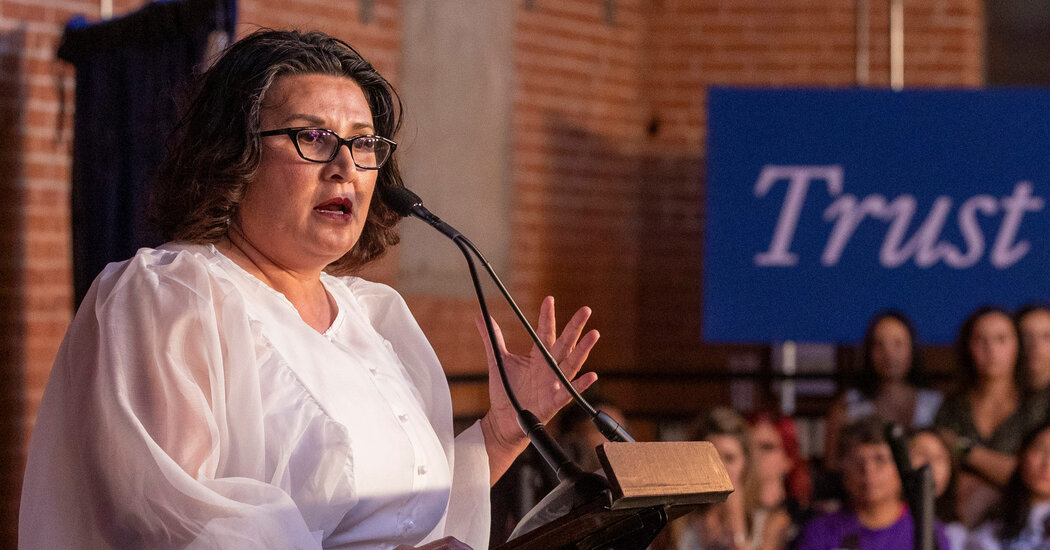One candidate in Michigan would be the first Navy SEAL to serve in the House as a Democrat. Another Democrat in Arizona is a former Marine drill instructor seeking to be the first woman from the Marines to serve in the House. A third Democrat in New Jersey is a former Navy helicopter pilot whose campaign logo incorporates pilot wings.
The Democratic Party is turning to an unusually large crop of military veterans in an effort to flip the House in 2026, recruiting and promoting veterans in some of the top battleground districts in a reprisal of a strategy that helped deliver the House in 2018 during President Trump’s first term.
But this time the push for veterans is being embraced to a greater extent by a party establishment keenly aware of the urgent need for Democratic challengers to create distance from a national party brand that remains deeply unpopular.
“We can’t just have people who seem like tired old Democrats,” said Representative Seth Moulton, a Democrat from Massachusetts and a former Marine who has been involved in recruiting veteran candidates in recent years. “It’s a cycle when people are very frustrated with the Democratic Party — including Democrats.”
To retake the House, Democrats must flip at least three seats in 2026, and veterans are already running in at least triple that many swing districts — including in Colorado, Pennsylvania, Michigan, Nebraska, New York and Virginia — though most must still navigate competitive primaries. Some Democratic officials are in talks with or tracking more than 30 potentially new Democratic veteran candidates for the House.
Democratic political strategists say veterans can be especially effective in trying to stretch the map deeper into rural and Republican-leaning territory.
Representative Jason Crow of Colorado, a former Army Ranger who is helping to oversee candidate recruitment for the Democratic Congressional Campaign Committee, said strong candidates were more important in the short term than any of the high-minded debates about what ails Democrats.
“There’s a lot of talk about, you know, what is the singular, unifying message? Who is the leader of the Democratic Party? What is our big, bold policy idea?” Mr. Crow said. “All of those things are important, and we’re going to have those debates. But those things are largely not going to flip a seat that voted for Donald Trump.”
Veterans tend to make particularly effective candidates, he said, because their oath to put the country first still means something to voters. “What Americans are really thirsty for right now are leaders, not just politicians,” Mr. Crow said.
Mike Marinella, a spokesman for the National Republican Congressional Committee, noted that seven of the Republican incumbents in the most competitive seats are veterans themselves.
“Democrats across the nation are locked into a toxic competition over who will lurch furthest to the left, and it’s all trickling down from their persistent infighting on the national level,” he said. “They have no leader, no message and, soon, no formidable candidates because they simply can’t hide their extremism.”
The veteran recruiting push is part of the Democratic Party’s long-running battle to reclaim the mantle of patriotism from the G.O.P. Last year, small American flags were distributed to the crowd before Kamala Harris accepted the party’s nomination on the final night of its national convention. In June, House Democrats formed the partisan Democratic Veterans Caucus, with 18 members.
Travis Tazelaar, the political director of VoteVets, which recruits Democratic veteran candidates and runs ads supporting them, said veterans had a crucial advantage: Voters tend to presume they are politically moderate.
“The average voter looks at a veteran and doesn’t see them as a hard conservative right or a hard liberal left,” Mr. Tazelaar said.
Several Democrats pointed to JoAnna Mendoza, 48, as a promising candidate. She said voters could be surprised when she told them she was once a Marine drill instructor.
“Listen, I tell people, ‘I am not as lean, not as mean, but still a Marine, so don’t get confused,’” she said with a laugh. “I still know how to freaking take people out.”
Next fall, Ms. Mendoza will look to take out Representative Juan Ciscomani, a Republican who represents much of southeastern Arizona. She described herself as a single mother by choice who joined the Navy and then the Marines because her rural community had “no job opportunities.”
“The system isn’t designed for people like me,” she said.
In a sign of how many Democratic veterans are running, a second female Marine veteran, Maura Sullivan, is running for the House in New Hampshire. They could both make history as the first female Marines in Congress.
Ms. Mendoza and Ms. Sullivan are two of the four female veterans who have connected with one another in a group chat they’re calling “Hellcats,” after the female Marines who served in World War I. The veteran-recruiting group New Politics recently set up a shared fund-raising account for the women using the same name.
In Mr. Trump’s first midterm election, in 2018, Democrats won the House partly on the strength of a slate of veterans and women who had worked in national security, including Mikie Sherrill of New Jersey and Abigail Spanberger of Virginia (both now running for governor), Elissa Slotkin of Michigan (now a U.S. senator), Chrissy Houlahan of Pennsylvania (still in Congress) and Elaine Luria of Virginia (defeated in 2022 by Jen Kiggans, a Republican who herself was a Navy pilot).
“We saw this in 2018, that specifically female veterans and women with national security backgrounds are uniquely positioned at being able to flip seats red to blue,” said Rebecca Bennett, a former Navy helicopter pilot and a member of the Hellcats chat. Ms. Bennett is running to unseat Representative Tom Kean Jr., a New Jersey Republican.
One person whose name has surfaced as a dream recruit is Jimmy McCain, the son of John McCain, the longtime Republican senator from Arizona who died in 2018. The younger Mr. McCain, who has served in both the Marines and the Army National Guard, became a Democrat last year and endorsed Ms. Harris. In a brief interview he said he was actively serving and had no interest in running for Congress.
In Michigan, Matt Maasdam, a former Navy SEAL, said he hoped to bring “warrior energy” to Congress by defeating Representative Tom Barrett, a first-term Republican who served in the Army.
“People think that things SEALs do can be impossible, and yet we do them every day,” Mr. Maasdam said. “I hear a lot of people saying, like, ‘We can’t change the direction of the country. It’s impossible.’ I’m like, ‘What are you talking about?’ It takes a couple strong voices at the right time to put us right where we want to be.”
At one point, Mr. Maasdam served as President Barack Obama’s military aide — better known as the person who handles the “nuclear football” that contains launch codes.
Like many of the Democratic veterans running, Mr. Maasdam must survive competitive primaries before getting to take on a Republican. He faces a primary that includes another candidate with foreign-affairs credentials: Bridget Brink, a career diplomat who served as the U.S. ambassador to Ukraine from 2022, when Russia invaded the country, until resigning this year. She is one of several congressional candidates who quit government positions in protest.
In Pennsylvania, Ryan Crosswell is running only months after stepping down from the Justice Department’s Public Integrity Section over concerns that the Trump administration was politicizing it.
Mr. Crosswell hopes his service in the Marines will resonate with primary and general-election voters alike in a seat that Republicans flipped in 2024.
“The reason the military is so respected among the American public is because it’s seen as sort of a last bastion of nonpartisan commitment to country first,” he said.
Another veteran and former federal prosecutor who resigned from the Justice Department this year, Zach Dembo, hopes to fill a congressional seat in Kentucky that opened when Representative Andy Barr, a Republican, decided to run for Senate.
That district has not been competitive since 2018, when Amy McGrath, yet another Democratic veteran, lost narrowly to Mr. Barr.
Representative Chris Deluzio, a Pennsylvania Democrat who served in the Navy, said that when voters heard a candidate had been in the armed services, they tended to “at least give you a chance to make a pitch.”
“We are in a moment where we are seeing the right act like they have some monopoly on patriotism and loving this country, and it’s like, I think that’s complete and total B.S.,” he said. “We need a fighting Democratic Party, and I know that so many of my fellow veterans who wore the uniform know what it is to take on a righteous, tough fight.”
Shane Goldmacher is a Times national political correspondent.
The post In Battle for House, Democrats Are Calling Up Military Recruits appeared first on New York Times.




